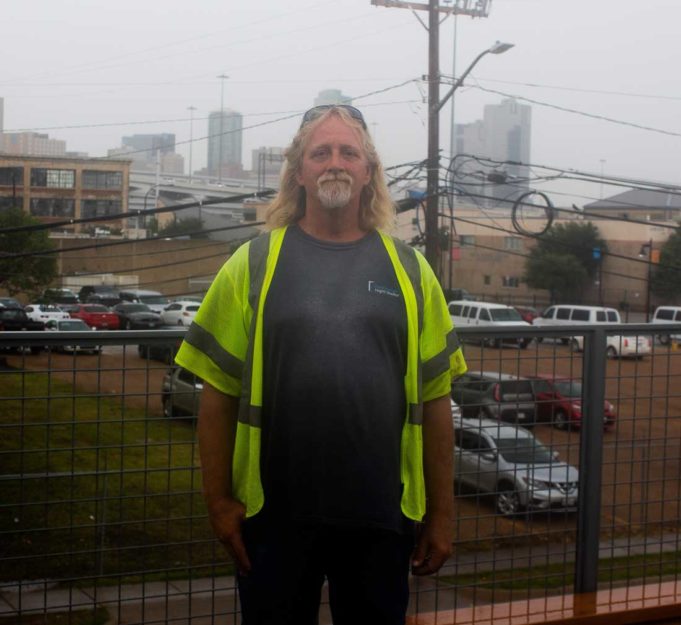For the past 18 months, Frank Crist has been cleaning litter with a small crew around the city, most recently at Echo Lake in south Fort Worth. After a short stint in prison, the 53-year-old Fort Worth native said he was unable to find work. Employers weren’t interested in hiring a former inmate, he said. When his time was up at a local halfway house, Crist said he was forced to live on the streets for two years before eventually finding help through a two-year-old self-sustaining program that’s managed by the Presbyterian Night Shelter.
He recently moved into an apartment near Ridgmar Mall. Now, he’s saving money. He hopes the city will hire him on a permanent basis to do work similar to what he does now.
“With my history, it was hard finding work,” he said. “Now, I’m trying to stay on my feet.”
Clean Slate received a $450,000 boost from the city last June after an initial $49,000 annual contract to pick up litter in Fort Worth. Staff from the city and night shelter said the increased funds will allow the city to meet its litter pickup goals while saving taxpayer money and lowering the homeless count.
It’s not a handout, said Kisten Ham, Clean Slate director.
“We’ll clock in, grab coffee, and pack supplies,” she said. “The city provides our team with work orders for the day. The [city] contract is paid based on miles covered, not time.”
Clean Slate’s mission is to raise enough funds through its contracts with the city and private businesses to fund the for-profit social enterprise while providing homeless individuals with health benefits and a steady income ($8 to $10 per hour), which can lead to permanent housing and a steady job outside of the night shelter. Last year, 80 percent of Clean Slate staffers who stayed in the program more than six months were able to move into housing outside of the shelter, Ham said.
The night shelter houses around 4,600 men, women, and children per year.
While the litter component has garnered the most regional and national attention, Clean Slate’s 42 employees also contract for janitorial work and general staffing such as ticketing, temp work, and hotel maid services.
“We have not had anyone reenter the shelter,” Ham added. “Everyone who wanted to find a job” outside of this program has done so.
The new city contract funds three five-person crews, said Diane Covey, public information officer for Fort Worth Code Compliance, the department that oversees the city’s end of the litter program. Clean Slate’s litter crews have cleaned approximately 235 miles of streets and 10 lots since the new contract started last month, she said.
The program grew from a need to tackle littering along the East Lancaster Corridor, Ham said, referring to the area near the night shelter that attracts a lot of homeless. The night shelter and the Near East Side Neighborhood Association (NESNA) had been paying out of pocket for years to clean area streets when code compliance officials approached the two groups to find a solution that incorporated the city. The Clean Slate program was then developed, and Ham submitted a bid as required by all outside groups and businesses that work for the city.
“Our city has needed more attention on litter for a long time,” Ham said. “I can clean [much of] the city for less than what it would cost to staff a crew of five [city employees]. On top of that, by employing people who are struggling with homelessness, the city is putting tax monies to good use.”
Clean Slate’s first year ended with $300,000 in earned revenue, Ham said. The 2018-19 budget now tops $1 million. As the program grows, Ham said, so will the variety of services Clean Slate offers.
“Income and employment are [consistently] one of the top three reasons for homelessness,” she said. “There are so many barriers once you’ve lost your job. We’re able to create jobs that allow people to get back on their feet a lot faster.”
Fort Worth saw a small increase (5 percent) in the homeless count between 2017 and 2018, according to the city’s website. Homelessness on the western side of North Texas continues to be concentrated in Fort Worth, the city said. I asked Ham a question that’s on the mind of many residents living along East Lancaster.
Is this program going to end homelessness in Fort Worth?
“No,” she said. “Do I think this will have an impact for those who want to move out of homeless and reenter the workforce? Yes.”
Tara Perez, manager of Fort Worth’s Directions Home program, the city’s 10-year plan to make chronic homelessness “rare, short-term, and non-recurring,” said any program that allows “folks [in transition] to save up money to lease an apartment and have a wage allowing them to maintain that housing are essential to our homeless system.”
Clean Slate isn’t the first to hire homeless individuals as low-skilled labor. The real “game changer,” Ham said, is how her for-profit business is partnering with the city and private donors to save public tax dollars while tackling chronic homelessness in a significant way. Social enterprises aren’t as common in North Texas as they are on the East and West Coasts. Any for-profit business that works toward a charitable-minded mission is part of the growing trend, she said.












Have a terrific come back too work in the future thanks clean slate.